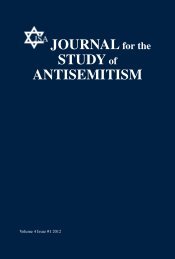Journal for the Study of Antisemitism
Journal for the Study of Antisemitism
Journal for the Study of Antisemitism
You also want an ePaper? Increase the reach of your titles
YUMPU automatically turns print PDFs into web optimized ePapers that Google loves.
224 JOURNAL FOR THE STUDY OF ANTISEMITISM [ VOL. 1:209<br />
<strong>the</strong> use <strong>of</strong> labeling someone as “Jew” as a means <strong>of</strong> exclusion has striking<br />
connotations to <strong>the</strong> history <strong>of</strong> demonizing Jews and to <strong>the</strong> exclusion <strong>of</strong> Jews<br />
as <strong>the</strong> enemy from within. The following statement is an example <strong>of</strong> exclusionary<br />
function <strong>of</strong> labeling someone “Jew.”<br />
“You Jew” [means] that you are something worse, that you are not up to<br />
our level so to say.<br />
(Fatin, Berlin, P6: 124-125)<br />
Labeling someone as “Jew” makes him or her a Jew—as conceptualized by<br />
those who use <strong>the</strong> term—even if it is only temporarily: The antisemites<br />
define who is a Jew. It also shows how illusionary and lunatic Jewishness is<br />
in <strong>the</strong> mind <strong>of</strong> antisemites.<br />
2. There is a correlation between <strong>the</strong> pejorative use <strong>of</strong> “Jew” and antisemitic<br />
stereotypes: All but two interviewees who use “Jew” as an insult also<br />
showed antisemitic attitudes in o<strong>the</strong>r <strong>for</strong>ms, such as <strong>the</strong> conviction that “<strong>the</strong><br />
Jews” are rich and particularly influential in business or <strong>the</strong> media.<br />
3. The interviewees <strong>the</strong>mselves do not consistently make a distinction<br />
between a pejorative use <strong>of</strong> <strong>the</strong> words <strong>for</strong> “Jew” and concrete Jews. In fact,<br />
interviewees relate <strong>the</strong> pejorative use <strong>of</strong> <strong>the</strong> words <strong>for</strong> “Jew” directly to<br />
antisemitic attitudes. This attitude can be observed in <strong>the</strong> interviewee’s<br />
description below <strong>of</strong> <strong>the</strong> word’s pejorative usage and his immediate association<br />
with <strong>the</strong> perception <strong>of</strong> Jews by o<strong>the</strong>rs:<br />
If you say, “dirty Jew” [sale Juif], I know many people who are, erm. . .<br />
who don’t like <strong>the</strong> Jews [Juifs].<br />
(Samed, Paris P38: 313)<br />
But antisemitic attitudes can also be related to <strong>the</strong>ir own pejorative usage <strong>of</strong><br />
<strong>the</strong> words <strong>for</strong> “Jew.” One interviewee, <strong>for</strong> example, explained an<br />
antisemitic proverb and stated that it is an allusion to Jews, portraying stereotypes<br />
he actually believes in:<br />
Eating Jewish [manger en juif], that’s hiding <strong>for</strong> eating . . . That’s an<br />
expression that <strong>the</strong> Jew [Juif] doesn’t want to share . . . <strong>the</strong> misers. Often<br />
<strong>the</strong> miser, it’s a Jew [Juif], “Ah you are a Jew [Juif], share it!,” you see?<br />
. . . . There are <strong>of</strong>ten little connotations to Jews [Juifs] like that.<br />
Q: And do you think that <strong>the</strong>re is something true to it, in that?<br />
Sure. . . I don’t know.<br />
(Sabri, Paris, P57: 549-559)<br />
Even if interviewees <strong>of</strong>ten do not have concrete Jews in mind when using<br />
<strong>the</strong> word “Jew,” concrete Jews are always connoted in <strong>the</strong> use <strong>of</strong> <strong>the</strong> words<br />
<strong>for</strong> “Jew.” Participants demonstrate this by expressing negative stereotypes














